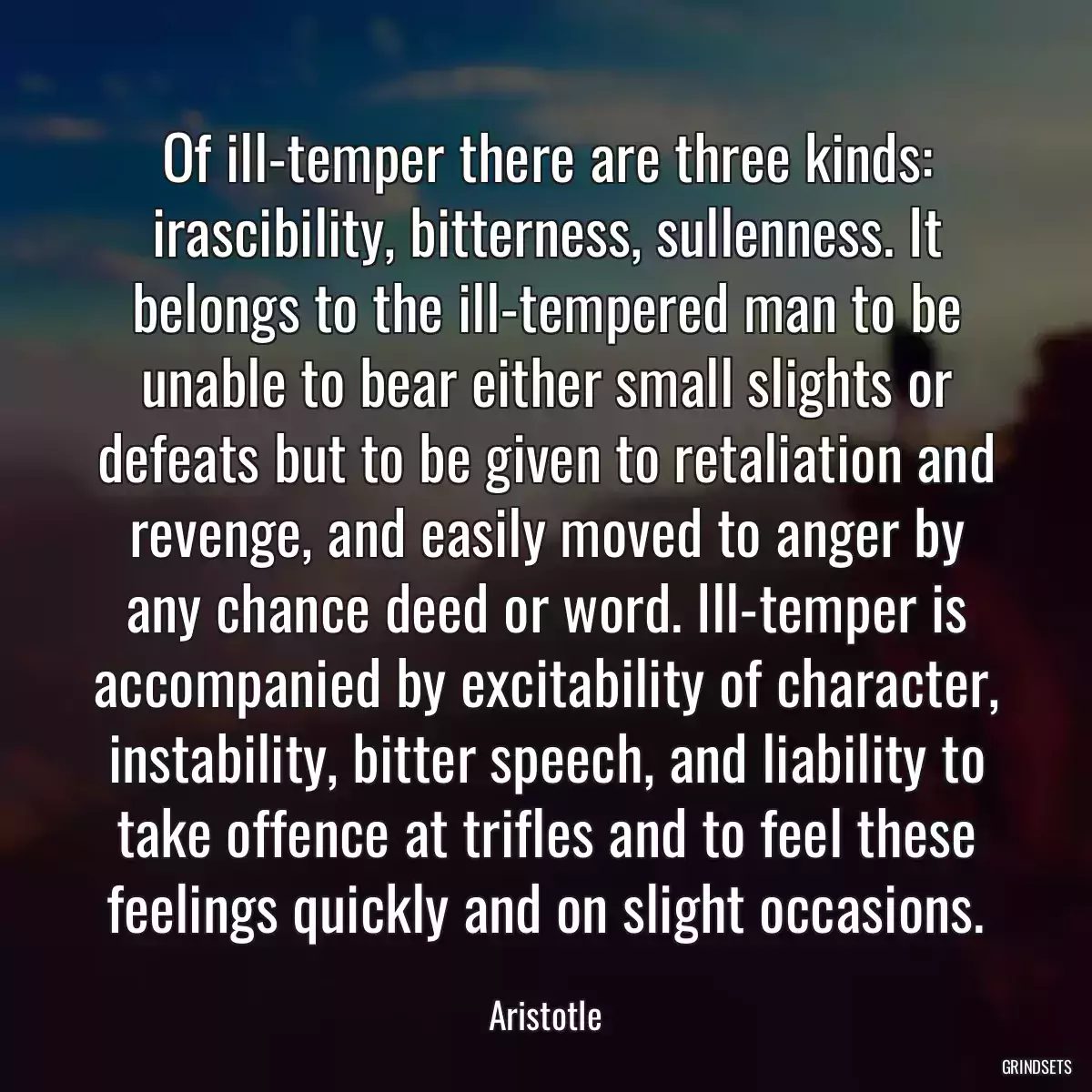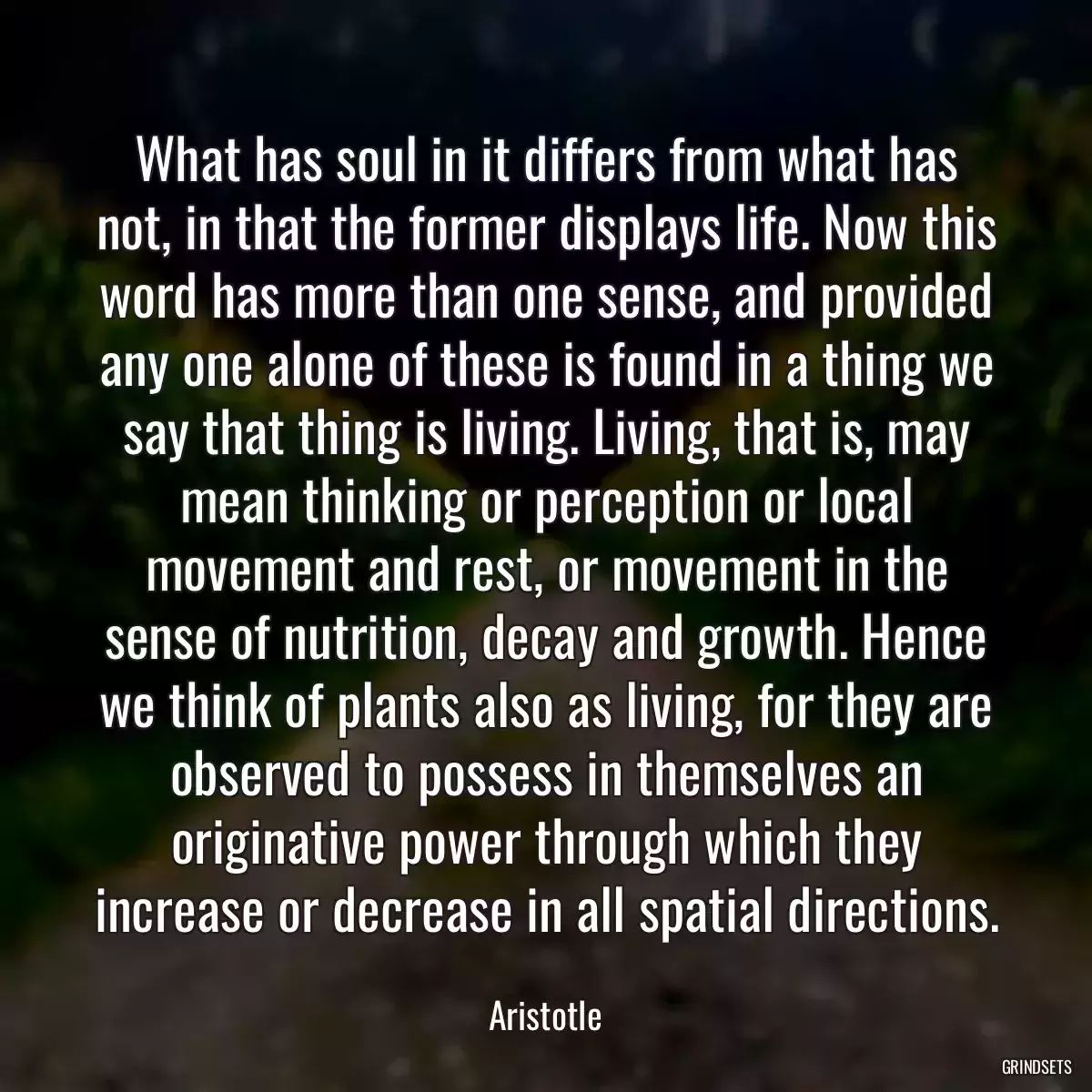
Quotes Aristotle - page 6
Find dozens of Aristotle with images to copy and share.

Our account does not rob the mathematicians of their science... In point of fact they do not need the infinite and do not use it.
It is true, indeed, that the account Plato gives in 'Timaeus' is different from what he says in his so-called 'unwritten teachings.'
Philosophy is the science which considers truth.
You may also like
There is more evidence to prove that saltness [of the sea] is due to the admixture of some substance, besides that which we have adduced. Make a vessel of wax and put it in the sea, fastening its mouth in such a way as to prevent any water getting in. Then the water that percolates through the wax sides of the vessel is sweet, the earthy stuff, the admixture of which makes the water salt, being separated off as it were by a filter.
Anaximenes and Anaxagoras and Democritus say that its [the earth's] flatness is responsible for it staying still: for it does not cut the air beneath but covers it like a lid, which flat bodies evidently do: for they are hard to move even for the winds, on account of their resistance.
Rhetoric is useful because the true and the just are naturally superior to their opposites, so that, if decisions are improperly made, they must owe their defeat to their own advocates; which is reprehensible. Further, in dealing with certain persons, even if we possessed the most accurate scientific knowledge, we should not find it easy to persuade them by the employment of such knowledge. For scientific discourse is concerned with instruction, but in the case of such persons instruction is impossible.
If then, as we say, good craftsmen look to the mean as they work, and if virtue, like nature, is more accurate and better than any form of art, it will follow that virtue has the quality of hitting the mean. I refer to moral virtue [not intellectual], for this is concerned with emotions and actions, in which one can have excess or deficiency or a due mean.
In the case of some people, not even if we had the most accurate scientific knowledge, would it be easy to persuade them were we to address them through the medium of that knowledge; for a scientific discourse, it is the privilege of education to appreciate, and it is impossible that this should extend to the multitude.

Of ill-temper there are three kinds: irascibility, bitterness, sullenness. It belongs to the ill-tempered man to be unable to bear either small slights or defeats but to be given to retaliation and revenge, and easily moved to anger by any chance deed or word. Ill-temper is accompanied by excitability of character, instability, bitter speech, and liability to take offence at trifles and to feel these feelings quickly and on slight occasions.
Emotions of any kind are produced by melody and rhythm; therefore by music a man becomes accustomed to feeling the right emotions; music has thus the power to form character, and the various kinds of music based on various modes may be distinguished by their effects on character.
For suppose that every tool we had could perform its task, either at our bidding or itself perceiving the need, and if-like the statues made by Dædalus or the tripods of Hephæstus, of which the poet says that "self-moved they enter the assembly of the gods" - shuttles in a loom could fly to and fro and a plectrum play a lyre all self-moved, then master-craftsmen would have no need of servants nor masters of slaves.
The tyrant, who in order to hold his power, suppresses every superiority, does away with good men, forbids education and light, controls every movement of the citizens and, keeping them under a perpetual servitude, wants them to grow accustomed to baseness and cowardice, has his spies everywhere to listen to what is said in the meetings, and spreads dissension and calumny among the citizens and impoverishes them, is obliged to make war in order to keep his subjects occupied and impose on them permanent need of a chief.
Quid quid movetur ab alio movetur"(nothing moves without having been moved).
For what is the best choice for each individual is the highest it is possible for him to achieve.
[Prudence] is the virtue of that part of the intellect [the calculative] to which it belongs; and . . . our choice of actions will not be right without Prudence any more than without Moral Virtue, since, while Moral Virtue enables us to achieve the end, Prudence makes us adopt the right means to the end.
...for all men do their acts with a view to achieving something which is, in their view, a good.
Two characteristic marks have above all others been recognized as distinguishing that which has soul in it from that which has not - movement and sensation.
You may also like

What has soul in it differs from what has not, in that the former displays life. Now this word has more than one sense, and provided any one alone of these is found in a thing we say that thing is living. Living, that is, may mean thinking or perception or local movement and rest, or movement in the sense of nutrition, decay and growth. Hence we think of plants also as living, for they are observed to possess in themselves an originative power through which they increase or decrease in all spatial directions.
The ensouled is distinguished from the unsouled by its being alive. Now since being alive is spoken of in many ways, even if only one of these is present, we say that the thing is alive, if, for instance, there is intellect or perception or spatial movement and rest or indeed movement connected with nourishment and growth and decay. It is for this reason that all the plants are also held to be alive . . .